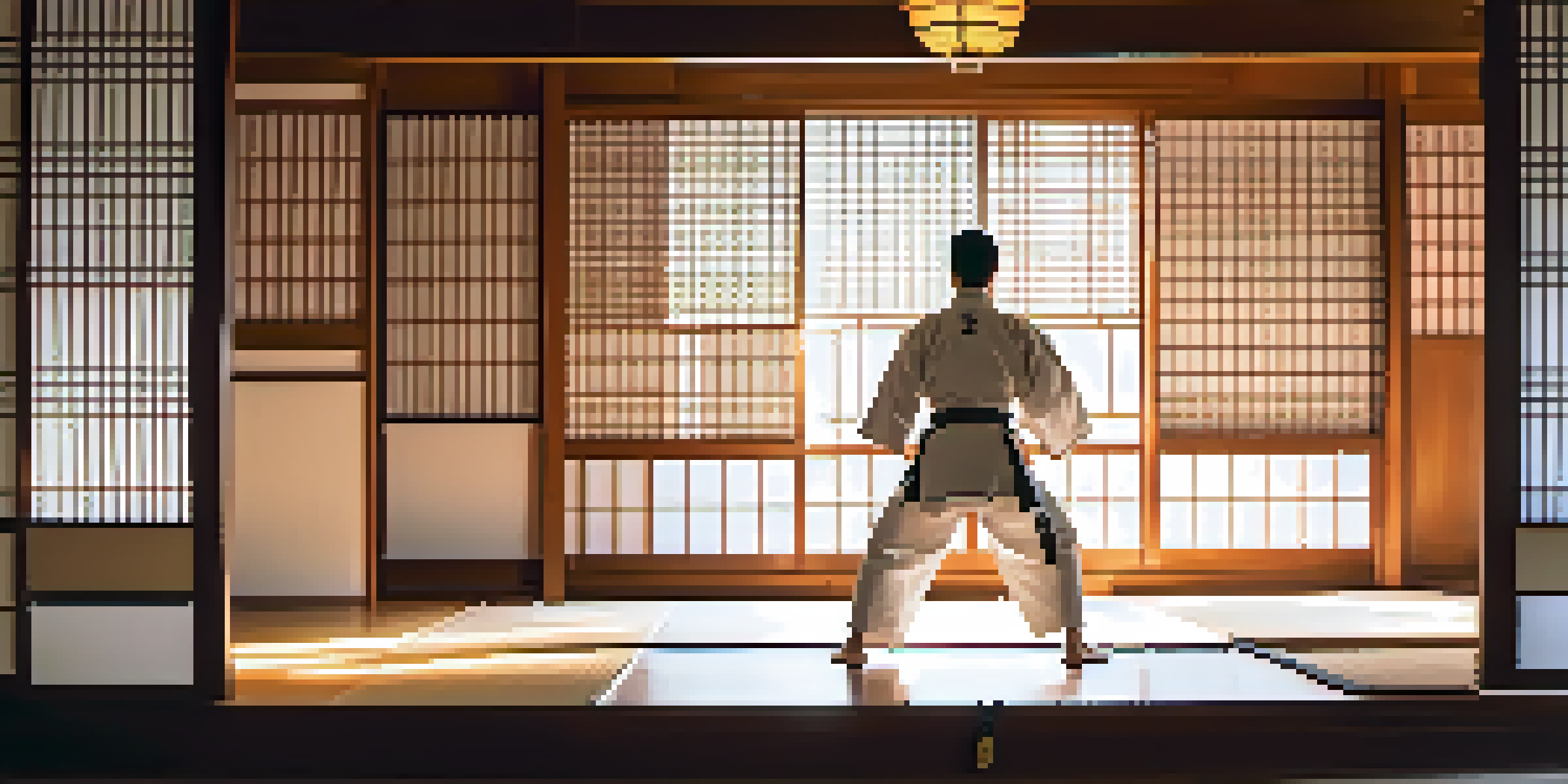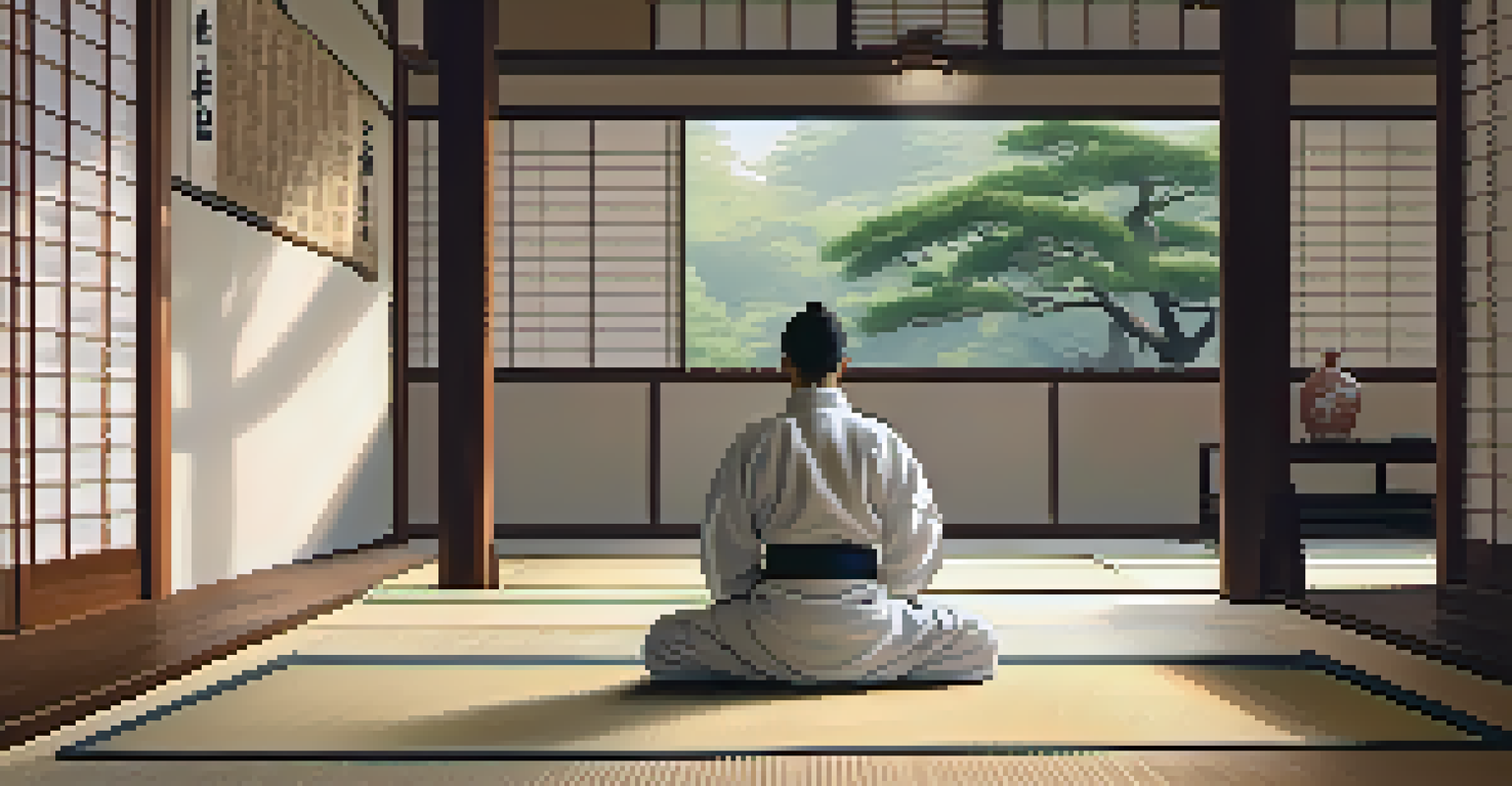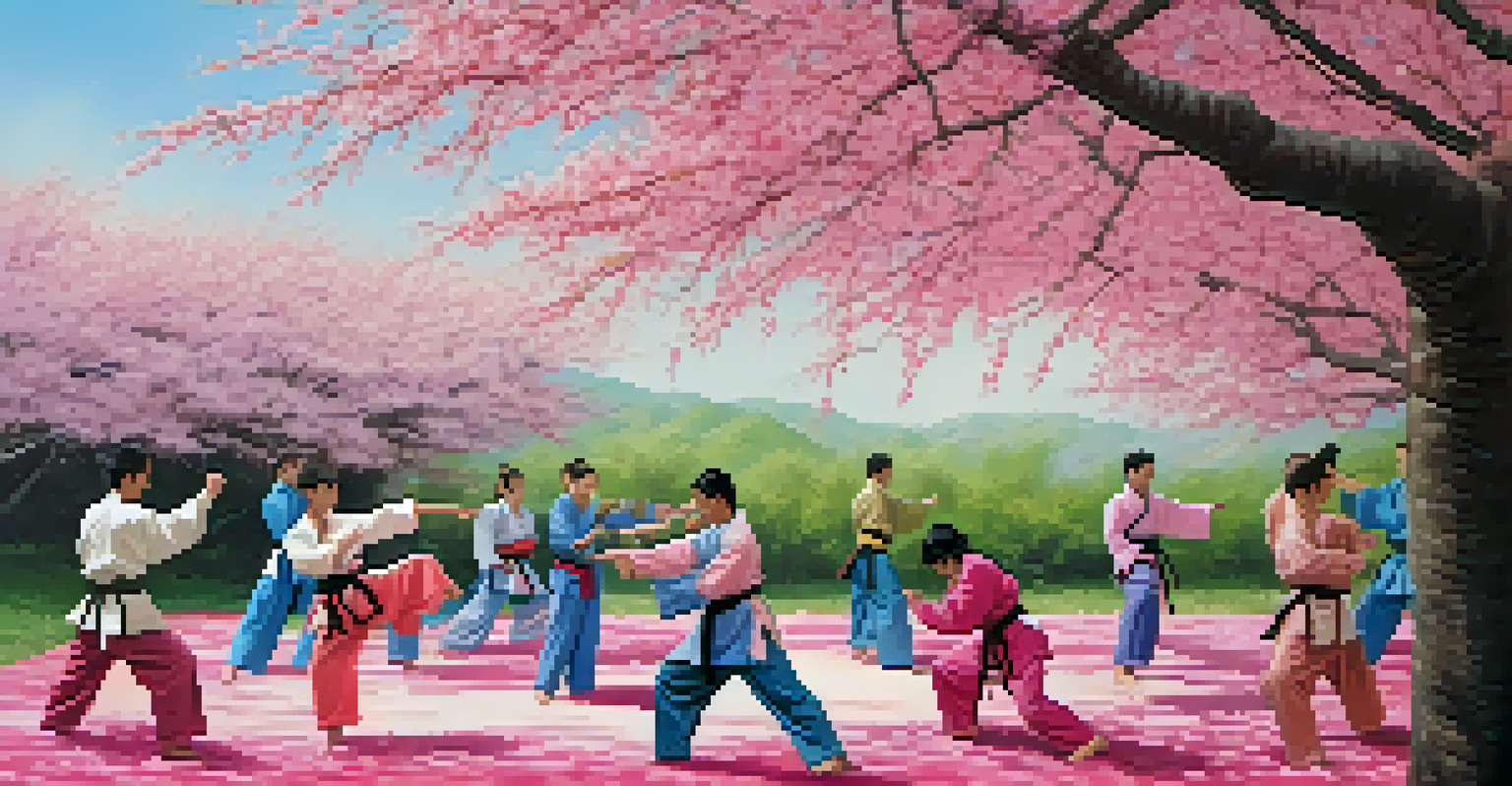Philosophical Teachings in Martial Arts and Cultural Exchange

Understanding Martial Arts as a Philosophical Practice
Martial arts are often viewed solely as physical disciplines, but they are deeply rooted in philosophical teachings. At their core, many martial arts emphasize principles like respect, discipline, and self-control. These concepts not only enhance physical performance but also foster personal growth, encouraging practitioners to reflect on their own values and behaviors.
The ultimate aim of martial arts is not having to use them.
For example, the practice of karate is often accompanied by the philosophy of 'dojo kun,' a set of guiding principles that promote integrity and perseverance. This integration of philosophy into training helps students understand that martial arts is as much about mental resilience as it is about physical strength. The journey of mastering a martial art becomes a path of self-discovery and ethical development.
Furthermore, the philosophical teachings inherent in martial arts can serve as a bridge to understanding different cultures. As practitioners explore these teachings, they also learn about the historical and cultural contexts that shaped them, leading to a richer appreciation of diversity.
The Role of Zen in Eastern Martial Arts
Zen philosophy plays a significant role in many Eastern martial arts, particularly in disciplines like judo and aikido. The concept of 'mindfulness' is central to Zen, teaching practitioners to focus fully on the present moment. This mindfulness training not only enhances performance but also cultivates a sense of inner peace and clarity.

For instance, a judo practitioner learns to remain calm and composed during a match, allowing them to read their opponent's movements and react effectively. This mental clarity, cultivated through Zen practices such as meditation, can lead to improved decision-making both on and off the mat. By integrating Zen principles, martial artists can achieve a harmonious balance between body and mind.
Martial Arts as Personal Growth
Martial arts practice fosters personal development through principles like respect, discipline, and self-reflection.
Moreover, the practice of Zen in martial arts encourages a philosophical inquiry into the nature of existence and the self. As martial artists engage with these concepts, they embark on a transformative journey that connects them to a broader philosophical discourse.
Cultural Exchange Through Martial Arts
Martial arts have historically been a conduit for cultural exchange, allowing different traditions and philosophies to intermingle. As martial arts spread across the globe, they adapted and evolved, incorporating elements from various cultures. This blending not only enriched the martial arts themselves but also fostered a greater understanding among practitioners from diverse backgrounds.
The mind is everything. What you think you become.
For example, Brazilian Jiu-Jitsu, which has its roots in Japanese jiu-jitsu, showcases how techniques and philosophies can transcend borders. Practitioners around the world have infused their unique perspectives and experiences, creating a dynamic and evolving discipline. This cultural exchange fosters camaraderie and respect among martial artists, promoting a sense of global community.
Additionally, the sharing of martial arts philosophies often leads to deeper conversations about ethics, discipline, and respect. As practitioners learn from each other, they gain insights into different ways of thinking, encouraging an open-minded approach to cultural differences.
Philosophical Reflections in Training Routines
Training routines in martial arts often serve as a microcosm for philosophical exploration. The repetition of techniques and forms encourages practitioners to reflect on concepts such as patience, perseverance, and humility. Each training session can be seen as an opportunity to confront one’s limitations and strive for personal growth.
For instance, the process of perfecting a single technique can take years, teaching students the value of dedication and hard work. This journey of continuous improvement mirrors many philosophical teachings that emphasize the importance of the process over the end result. By embracing this mindset, martial artists cultivate resilience and a deeper understanding of their own potential.
Cultural Exchange and Diversity
The global spread of martial arts facilitates cultural exchange, enriching practices and promoting understanding among diverse communities.
Moreover, the rituals and traditions surrounding training, such as bowing to the dojo or instructor, reinforce the philosophical values of respect and gratitude. These practices not only enhance the training experience but also instill a sense of belonging and community among practitioners.
The Influence of Western Philosophy on Martial Arts
While many martial arts originate from Eastern philosophies, Western thought has also made significant contributions to martial arts practices. Concepts such as existentialism and ethics have influenced the way practitioners approach their training and personal development. This cross-pollination of ideas enriches the martial arts experience and broadens the philosophical framework within which practitioners operate.
For example, the existential idea of 'creating one's own essence through actions' resonates strongly with martial artists. It encourages them to take ownership of their training and personal growth, emphasizing that they are not merely passive recipients of knowledge but active participants in their journey. This empowerment can lead to profound transformations on and off the mat.
Additionally, Western philosophical inquiries into morality and ethics can inform how martial artists navigate conflicts and challenges. By engaging with these philosophical perspectives, practitioners can develop a well-rounded understanding of their responsibilities as martial artists, both in competition and in life.
Martial Arts as a Path to Personal and Social Philosophy
Engaging in martial arts often leads individuals to develop their own personal philosophy. The challenges faced in training—be it overcoming a physical obstacle or managing stress during a competition—encourage introspection and self-examination. This process can help practitioners clarify their values and beliefs, ultimately shaping their worldview.
For instance, someone who practices taekwondo may come to value discipline and respect, not just in their sport but in all areas of life. This personal philosophy can guide their interactions with others and influence their decisions, fostering a sense of responsibility and ethical behavior. In this way, martial arts become a catalyst for personal growth and philosophical development.
Philosophy Shapes Training
Philosophical teachings integrated into training encourage introspection and resilience, influencing both martial arts practice and life.
Moreover, the collective experience of martial arts communities can lead to broader social philosophies. As practitioners interact and share their insights, they can cultivate a shared understanding of values such as respect, humility, and cooperation, which can extend beyond the dojo into their everyday lives and communities.
The Future of Martial Arts and Philosophical Teaching
As martial arts continue to evolve, the integration of philosophical teachings is likely to grow. With the rise of global communication, practitioners from various backgrounds can share their insights and experiences, fostering a richer philosophical dialogue. This exchange can lead to innovative approaches in training that incorporate diverse philosophical perspectives.
Furthermore, as society grapples with challenges such as conflict resolution and personal well-being, the philosophical principles embedded in martial arts can offer valuable tools. The teachings of respect, discipline, and mindfulness can resonate with a broader audience, making martial arts relevant in a fast-paced, modern world.

In conclusion, the future of martial arts is bright, with the potential for philosophical teachings to inspire and enrich the lives of practitioners everywhere. As we embrace these teachings, we not only enhance our martial arts practice but also contribute to a more thoughtful and connected global community.